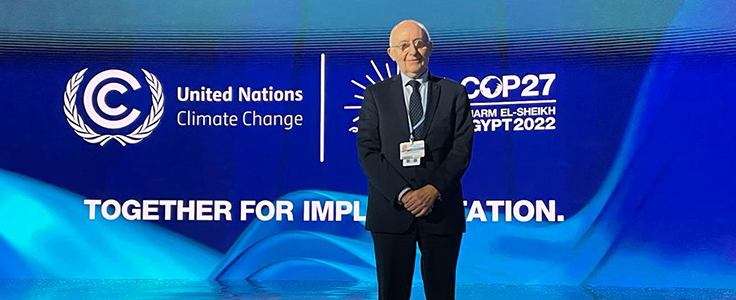Participating in a round table of Heads of State, Prime Ministers and Chiefs of International Organizations during the COP 27 in Egypt, ICAO Council President Salvatore Sciacchitano advocated for the realization of the ICAO Assembly's decision to reach net zero emissions from air transport by 2050.
"Achieving net-zero carbon emissions by 2050 will require substantial and sustained investment and financing over the coming decades. We must furthermore assure reliable and affordable support and capacity-building for the many developing countries and States with particular needs, who will be depending on it to help play their part," said Sciacchitano, noting that the work to begin addressing these objectives for the sector has begun.
The ICAO chief noted that this goal is to be achieved collectively, without attribution of specific obligations or commitments in the form of emission reduction goals to individual states.
One of the key features of the agreement is the recognition that each State's special circumstances and respective capabilities will inform each State's ability to contribute, and within its own national timeframe.

ICAO Council President Salvatore Sciacchitano. (Source: ICAO)
Legal frameworks, modernized infrastructure
"ICAO is fully cognizant of its global responsibilities towards the sustainable future of the international aviation sector, and of the planet. We also remain deeply cognizant of the critical importance of international air connectivity to the civil societies and economies of Small Island Developing States, Landlocked Developing Countries, and Least Developed Countries," the ICAO president said.
"As aviation continues to explore and adopt the incredible new technological innovations arising today in aeronautics and renewable energy propulsion, ICAO also recognizes how imperative it is to start putting in place the right policies, legal frameworks and modernized infrastructure to enable this evolution to emissions-free flight," Sciacchitano added.
ICAO noted, for example, that it launched its Assistance, Capacity-building and Training for Sustainable Aviation Fuels (ACT-SAF) programme in June to provide tailored support to States on sustainable fuel development and deployment and facilitate related partnerships worldwide.
The ICAO chief noted that an increasing number of States and international organizations are becoming actively involved in this programme and it expects many more States and organizations to join in the coming months.
"To reduce the impacts of aviation on the global climate, States, the industry, and all other relevant stakeholders have in fact been pursuing a basket of CO2 reduction measures through ICAO for many years now," Sciacchitano said.
He then pointed out that this contributed to modern aircraft being 70% quieter and 80% more fuel-efficient than their early predecessors.
"The introduction of radical, disruptive, and in many cases revolutionary innovations in technologies and operations is now required to deliver the overall decarbonization needed to keep global temperatures in check," the ICAO president further said.
Sciacchitano added that this transition, fuelled by frontier technologies featuring many new entrants to the aviation ecosystem, holds tremendous economic potential for developing States.
"We are greatly encouraged at ICAO that it can also help establish a more level playing field toward an inclusive and effective global green transition in aviation in the coming decades," he said.
In the immediate term, ICAO Member States and industry will continue pursuing additional sustainability objectives, notably through the aforementioned expanded use of sustainable aviation fuels and the ongoing implementation of the Carbon Offsetting and Reduction Scheme for International Aviation (CORSIA).